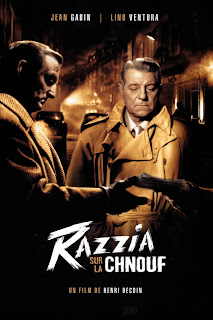Razzia sur la chnouf (1955, Henri Decoin)
 Prior to the exciting explosion that was the French New Wave, the noir phase was ever prevalent in the motherland of Cinema. In fact, France had its own movement at the time called the "polar" film, a kind of police cat-and-mouse film which usually involved the coat-wearing gangster type and revolved around a mystery type plot or heist. These films can actually be traced back to the 1920s, yet mostly gained popularity in the 1950s.
Prior to the exciting explosion that was the French New Wave, the noir phase was ever prevalent in the motherland of Cinema. In fact, France had its own movement at the time called the "polar" film, a kind of police cat-and-mouse film which usually involved the coat-wearing gangster type and revolved around a mystery type plot or heist. These films can actually be traced back to the 1920s, yet mostly gained popularity in the 1950s.Emulating the American Film-Noir formula, it became cemented in style and essence with the release of Touchez pas au grisbi. A film which both brought the great Jean Gabin back into the limelight and introduced one of my favourite actors, Lino Ventura, both whom eventually became staples in the genre. This was followed by the American directed Rififi, one of the greatest heist films of all time, Bob le flambeur of whom the director (Jean-Pierre Melville, my favourite French director) flourished within this subgenre, and Elevator to the Gallows, to name a few.
Now granted this film may not pack the wallop of these previously mentioned masterpieces, alas I feel it's severely underseen and underappreciated. For starters, all four of the previous films had received the Criterion Collection touch and are constantly mentioned in numerous noir/crime lists. Be honest, when was the last time you've seen the film Razzia mentioned on a film list?
Henri 'Le Nantais' (Gabin) has now returned to Paris from a 10-year successful run abroad (mostly America) and gained a phenomenal reputation in the business. Now Liski, the major crime lord in the drug world, wants Henri to handle things here at home and bring things up to speed. And as a front for the police, who are hot on Henri's train, he's to run a bistro with the staff of his choice.
He's to visit all the manufacturers and dealers, witness all the links of the business at first hand and see what is to be improved, including how the opium enters the country. "Be ruthless to intermediaries" Henri is told, or to those opting out of the business, "there's only one way to leave the organisation," Liski tells him.
Click here for the original French trailer
Rating: A-





Comments
Post a Comment